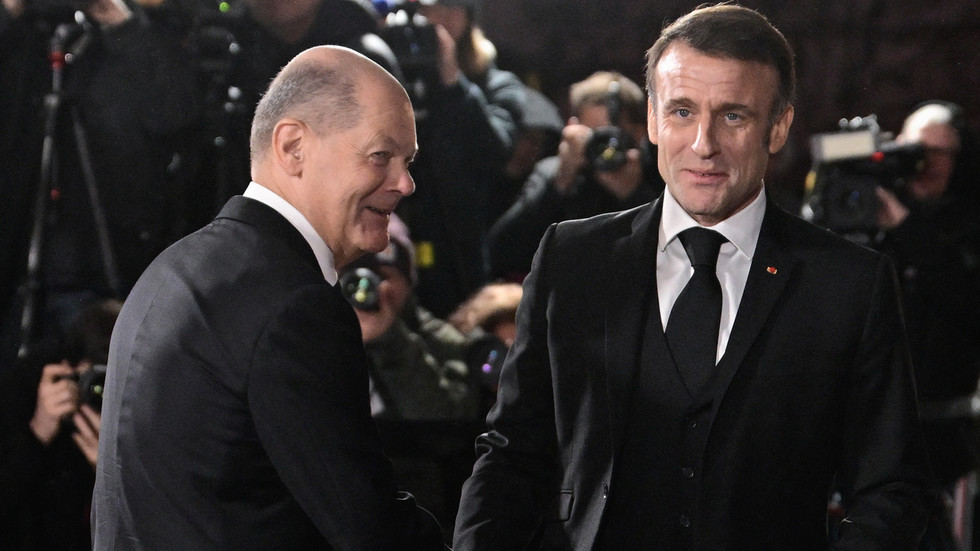
With Macron refusing to rule out a troop deployment, and a leaked conversation between German officers, more escalation is certain
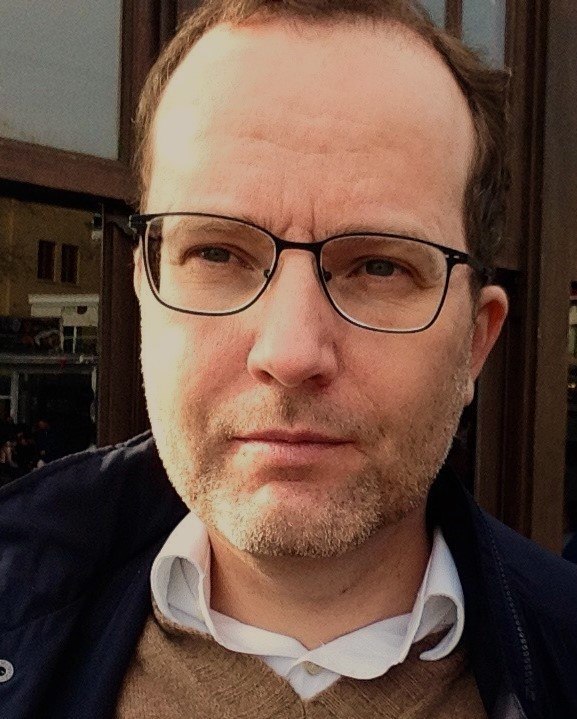
By Tarik Cyril Amar, a historian from Germany working at Koç University, Istanbul, on Russia, Ukraine, and Eastern Europe, the history of World War II, the cultural Cold War, and the politics of memory
By Tarik Cyril Amar, a historian from Germany working at Koç University, Istanbul, on Russia, Ukraine, and Eastern Europe, the history of World War II, the cultural Cold War, and the politics of memory
@tarikcyrilamartarikcyrilamar.substack.comtarikcyrilamar.com

German Chancellor Olaf Scholz (L) and French President Emmanuel Macron at the Chancellery in Berlin on January 22, 2024 © John MACDOUGALL / AFP
French President Emmanuel Macron and German Chancellor Olaf Scholz have disagreed publicly over how to support Ukraine – which has been ruthlessly deployed by the West as a geopolitical proxy – in its conflict with Russia. Macron used a special EU meeting he had convened, rumor has it directly inspired by Ukrainian President Vladimir Zelensky, to state, in effect, that sending Western combat troops into Ukraine was an option.
Of course, the West already has troops on the ground, including those flimsily camouflaged as volunteers and mercenaries, or otherwise participating in the conflict (for instance by planning and targeting), as a recent leak of US documents has confirmed. But an open intervention by ground forces would be a severe escalation, directly pitting Russia and NATO against each other, as Moscow has quickly pointed out, and making nuclear escalation a real possibility.
Russia has deliberately tolerated a certain degree of Western intervention, for its own pragmatic reasons: In essence, it seeks to win the war in Ukraine, while avoiding an open conflict with NATO. It is willing to pay the price of having to deal with some de facto Western military meddling, as long as it is confident it can defeat it on the Ukrainian battlefield. Indeed, the strategy has the added advantage that the West is bleeding its own resources, while the Russian military is receiving excellent hands-on training in how to neutralize Western hardware, including much-touted “miracle weapons.”
You do not have to believe Moscow’s words, but simply consult elementary logic to understand that there is an equally hard-headed limit to this kind of calculated tolerance. If the Russian leadership were to conclude that Western military forces in Ukraine were endangering its objectives (instead of merely making achieving them harder), it would raise the price for certain Western countries. (Selective treatment would be adopted to put under stress – quite possibly to breaking point – Western cohesion.)
Consider Germany, for instance: Berlin is by far Ukraine’s biggest bilateral financial supporter among EU states (at least in terms of commitments). Yet militarily, for now, Russia has been content with, in essence, shredding German Leopard tanks as they arrive on the battlefield. And, in a sense, punishing Germany’s meddling can safely be left to its own government: the country has already taken massive hits to its economy and international standing.
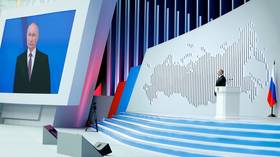
Read more
But if Berlin were to go even further, Moscow’s calculations would change. In that case, as little as German mass media allow German citizens to think about it, a “sobering” (to use a term from Russian doctrine) strike – initially probably non-nuclear – on German forces and territory is possible. The domestic consequences of such an attack are unpredictable. Germans might rally round the flag, or they might openly rebel against an already deeply unpopular government that has been sacrificing the national interest with unprecedented bluntness to Washington’s geopolitics.
If you think the above sounds a little far-fetched, I know of someone who clearly does not share your complacency: the German chancellor. Stung by Macron’s provocation, Scholz countered with telling alacrity. Within 24 hours after the surprise French move, he publicly ruled out the sending of “ground troops” by “European nations or NATO nations,” underlining that that this red line has always been agreed on.
In addition, the chancellor also chose exactly this moment to reaffirm that Germany will not deliver its Taurus cruise missiles to Kiev, as escalation that proponents have long demanded, including inside Germany. With, according to Scholz, the capability of striking Moscow, Berlin’s missiles in Ukrainian hands and Macron’s hypothetical ground forces have one thing in common: they come with a serious risk of spreading direct fighting beyond Ukraine, in particular to Western Europe and Germany.
In other words, the leaders of the two countries traditionally recognized as the core of the European Union have displayed profound disagreement on a key issue. Macron, it is true, often says more than he means or will care to remember. Scholz is an extreme opportunist, even by the standards of professional politics. In addition, clearly intentional indiscretions from the two men’s teams point to mutual and heartfelt antipathy, as Bloomberg has just reported. We could dismiss the spat between them as nothing but the result of incompatible political styles and personal animosity.

Read more
But that would be a grave mistake. In reality, their open discord is an important signal about the state of thinking, debate, and policy making within the EU, and, more broadly, NATO and the West. The real challenge is to decipher what this signal means.
Let’s start with something the two leaders will not openly admit but, it is virtually certain, share: The background to their quarrel is their fear that Ukraine and the West are not only losing the conflict, but more importantly in the information-streamlined West, that this defeat is about to become undeniably obvious. For instance, in the shape of further Russian advances, including strategic victories like the taking of Avdeevka and a partial or total collapse of Ukrainian defenses. Even the robustly bellicose Economist, for instance, is now admitting that Russia’s offensive is “heating up,” that the fall of Avdeevka has not made the Russian military pause, and that Ukrainians themselves are “becoming pessimistic.” Both Macron’s remarks and Scholz’s hasty disclaimer are indicators of a growing and well-founded pessimism, perhaps even incipient panic among Western elites.
Yet that does not tell us much about how these elites really intend to react to this losing game (assuming they know themselves, that is). In principle, there are two strategic options: raise the stakes (again) or cut your losses (finally). At this point, the “raise the stakes” faction is still dominating the policy debate. The negative response to Macron’s show-stealer move has overshadowed that the general trend of the NATO and EU strategy is still to add fresh resources to the fight, for instance by agreeing to source ammunition from outside the EU, a move long resisted by France. At least as far as the public is permitted to see, NATO and the EU are still run by sunk-cost-fallacy addicts: The more they have failed and lost already, the more they want to risk.
In reality, however, the option of deception and the temptation of self-deception (they easily blend into each other, an effect commonly known as “drinking your own Kool Aid”) make things more complicated: Take, for instance, Russia’s evidence, in verbatim transcript detail, of high-ranking German military officers discussing – or was it “brainstorming”? – how Ukraine could, after all, use Taurus missiles to attack the Kerch Strait Bridge that connects Crimea with the Russian mainland, while maintaining, in effect, plausible deniability. Scholz’s public statement that “German soldiers must at no point and in no place be linked” to Taurus attacks is proof that evading responsibility – or the impossibility to do so – are on his mind. As you would expect from a politician whose only strategy is finding the path of least resistance.
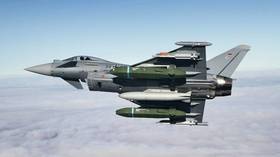
Read more
The muddled German response to this embarrassing intelligence fiasco (Why exactly was something so obviously sensitive discussed via hackable telecommunications instead of in a secure room, for instance?) only confirms that the Russian evidence is authentic. Instead of denying that the discussion took place, Germany has reacted – in typical authoritarian manner – by blocking social media accounts reporting it, and by trying to spin the conversation as nothing but a harmless thought experiment.
And yet, Scholz’s suspiciously elastic phrasing and the German officers’ discussion do not mean that such a course of naively transparent cheating will be adopted by Berlin. It may even have been a way of figuring out why that would not work.
Especially if this information is not entirely new, Russia’s choosing to publicize it now and perhaps even risking some (minor) intelligence disadvantage by revealing the extent of the German military’s penetration is, of course, also a signal to Germany’s leadership: Moscow will not play along with plausible deniability (a “don’t even try” message) and is deadly serious about this red line (a “we mean it” message). This as well may help focus minds in Berlin and make cheating less likely.
In any case, the evidence of German officers thinking about how to help attack Russia without leaving fingerprints does underline two things: Western public statements can easily be deliberate lies; and even when they are not, they are always open to radical revision. Indeed, Macron, too, alluded to that fact, pointing out that even if direct military intervention is not a consensus yet, it could become one in the future, just as other red lines have been crossed before.
In that light, Macron’s loose talk could be read as just another bluff – or, as they say in France, “strategic ambiguity”: a desperate attempt to strut so fiercely that Russia will not press its military advantage. If that was the French president’s intention, it has backfired spectacularly: Macron has provoked not only Germany but other, bigger Western players as well to clarify that they do not agree with him. Note to the Jupiterian self in the Élysée Palace: It’s not “ambiguous” when everyone who counts says “No way!”; it’s not very “strategic” either.
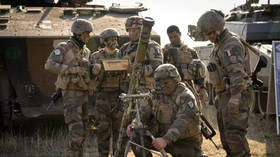
Read more
Yet it would be complacent to take solace from Macron’s current isolation. First, it is not complete: There are hardcore escalationists, such as the Estonian leader Kaja Kallas, in the EU and NATO who have praised him precisely because they want to drag everyone else into a direct clash with Russia. It is good that these especially zealous warmongers do not have the upper hand for now. But they have not been defeated or even appropriately marginalized either, and they will not give up.
Second, a strategy of escalation and threats can get out of hand. Consider the too-little-known fact that, in the July Crisis of 1914, just before World War I started, even the German emperor Wilhelm II had moments where he privately felt that it could still be avoided. That, however, was after he and his government had personally done their worst to bring the big war about. Lesson: If you take too many risks, at some point you may no longer be able to dial down the escalation you have promoted yourself.
Third, and most fundamentally, while rationally applied dishonesty is not unusual in international politics, for an international system to produce stability, it must first produce predictability. That, in turn, requires that even deception is kept within tacitly agreed limits and is, to a degree, predictable (because of its underlying rationality). The problem with the post-Cold War West is that it has chosen to forget and flaunt this basic rule of global order. Its addiction to unreliability is so severe that signals of escalation are inherently more credible than signals of de-escalation, as long as there is no principal, general, and clearly recognizable change of approach.
Put differently, Macron’s current isolation does not count for much because its due-diligence interpretation from Moscow’s perspective has to be that he merely went a little too far too soon. Neither Scholz’s nor other Western disavowals make a difference. What would make a difference is a united and clear signal by the West that it is now ready for genuine negotiations and a real compromise settlement. For now, the opposite remains true.
The statements, views and opinions expressed in this column are solely those of the author and do not necessarily represent those of RT.




